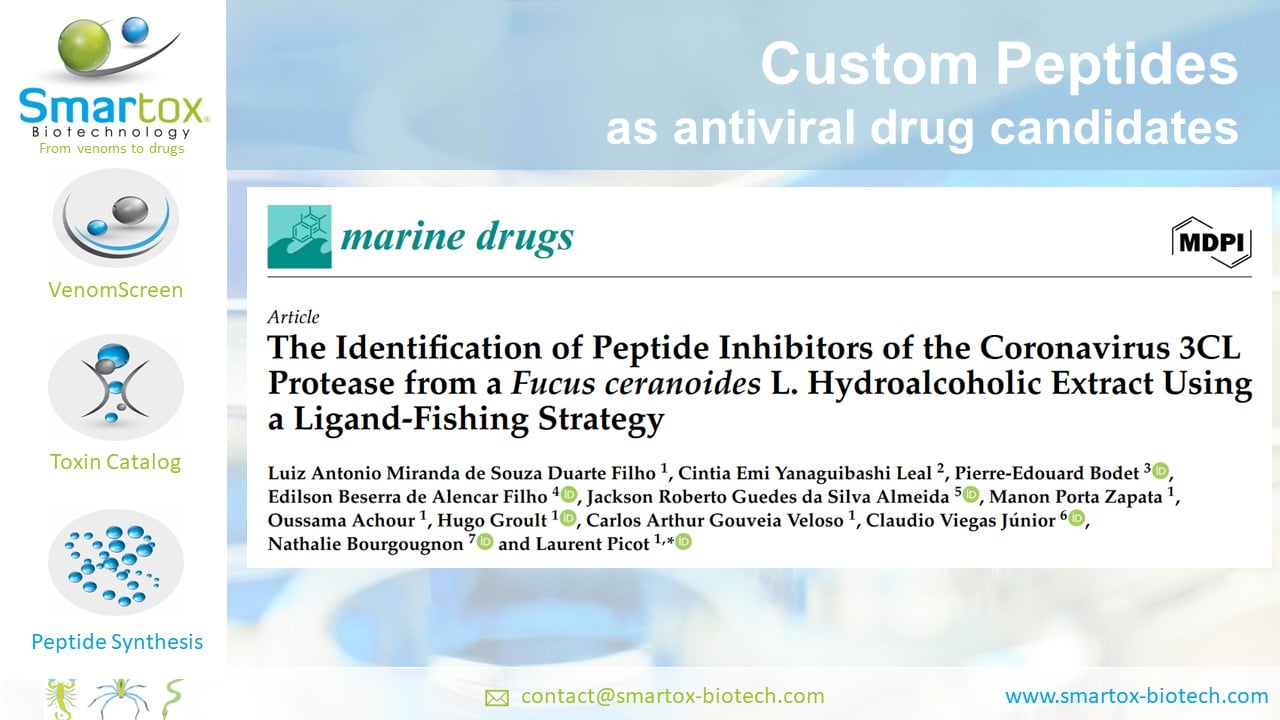The Identification of Peptide Inhibitors of the Coronavirus 3CL Protease from a Fucus ceranoides L. Hydroalcoholic Extract Using a Ligand-Fishing Strategy
New publication in Marine Drugs:
SB-PEPTIDE, a division of Smartox Biotechnology dedicated to custom peptide synthesis services, has been recognized once again as a key peptide supplier in a groundbreaking new scientific publication. This publication explores the potential antiviral properties of seven peptides identified from extracts of Fucus ceranoides, a species of brown algae. The study highlights the importance of peptides as promising antiviral drug candidates and underscores Smartox‘s commitment to advancing scientific research through their custom peptide synthesis services.
Abstract:
Brown seaweeds of the Fucus genus represent a rich source of natural antiviral products. In this study, a Fucus ceranoides hydroalcoholic extract (FCHE) was found to inhibit 74.2 ± 1.3% of the proteolytic activity of the free SARS-CoV-2 3CL protease (3CLpro), an enzyme that plays a pivotal role in polyprotein processing during coronavirus replication and has been identified as a relevant drug discovery target for SARS- and MERS-CoVs infections. To purify and identify 3CLpro ligands with potential inhibitory activity using a one-step approach, we immobilized the enzyme onto magnetic microbeads (3CLpro-MPs), checked that the enzymatic activity was maintained after grafting, and used this bait for a ligand-fishing strategy followed by a high-resolution mass spectrometry analysis of the fished-out molecules. Proof of concept for the ligand-fishing capacity of the 3CLpro-MPs was demonstrated by doping the FCHE extract with the substrate peptide TSAVLQ-pNA, resulting in the preferential capture of this high-affinity peptide within the macroalgal complex matrix. Ligand fishing in the FCHE alone led to the purification and identification via high-resolution mass spectrometry (HRMS) of seven hepta-, octa-, and decapeptides in an eluate mix that significantly inhibited the free 3CLpro more than the starting FCHE (82.7 ± 2.2% inhibition). Molecular docking simulations of the interaction between each of the seven peptides and the 3CLpro demonstrated a high affinity for the enzyme’s proteolytic active site surpassing that of the most affine peptide ligand identified so far (a co-crystallographic peptide). Testing of the corresponding synthetic peptides demonstrated that four out of seven significantly inhibited the free 3CLpro (from 46.9 ± 6.4 to 76.8 ± 3.6% inhibition at 10 µM). This study is the first report identifying peptides from Fucus ceranoides with high inhibitory activity against the SARS-CoV-2 3CLprotease which bind with high affinity to the protease’s active site. It also confirms the effectiveness of the ligand-fishing strategy for the single-step purification of enzyme inhibitors from complex seaweed matrices.
Smartox custom peptide services
Disclosed peptide toxins and others are available upon request. Feel free to browse our product catalog or contact us for project evaluation.
contact@smartox-biotech.com

